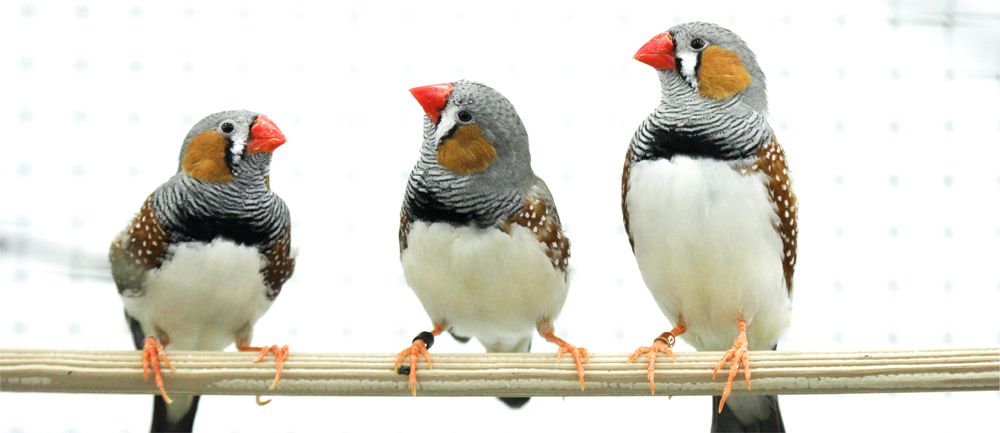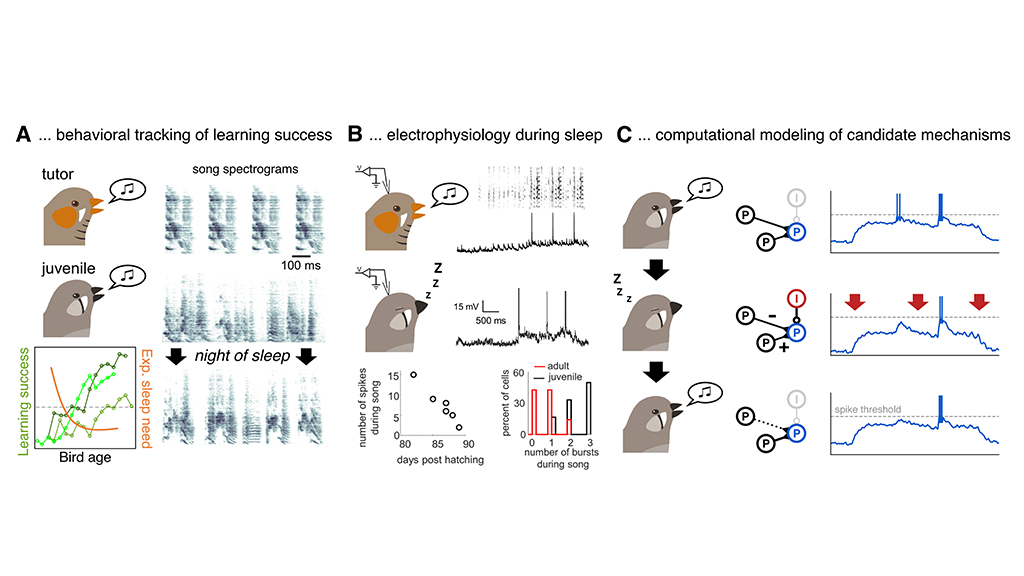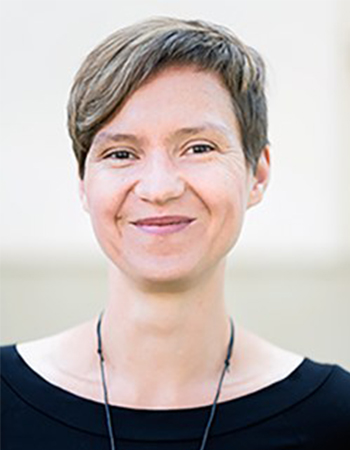A06
Song memory consolidation in sleeping zebra finches

Male zebra finches take 90 days to learn the tutor song of their father. The mechanisms underlying the consolidation of song memories during this period are unknown. Here, we investigate the processes in learning zebra finches during sleep following a combined experiment–theory approach. We will track the song learning success of juvenile zebra finches and relate it to time and duration of sleep phases. Then we will characterize changes in premotor and interneuron activity in HVC during singing and sleep across development. Hand in hand with the experiments, we will develop computational models that capture observed singing- and sleep-related neural activity and allow us to test alternative candidate mechanisms by which premotor reactivation during sleep facilitates song memory consolidation. We adopt the overarching hypothesis that inhibition during sleep plays an important role in the modifications of local circuits that result in a more efficient learning process during subsequent song practice.
Image Dr Susanne Seltmann
Graphical Abstract
 Graphical abstract: The project aims to explore song memory consolidation during sleep in learning zebra finches, by: (A) Tracking the song learning success of juvenile zebra finches and relating it to time and duration of sleep phases. (B) Characterizing changes in premotor and interneuron activity during singing and sleep across development. (C) Developing computational models that capture observed singing- and sleep-related neural activity and allow us to test alternativecandidate mechanisms by which premotor reactivation during sleep facilitates song memory consolidation
Graphical abstract: The project aims to explore song memory consolidation during sleep in learning zebra finches, by: (A) Tracking the song learning success of juvenile zebra finches and relating it to time and duration of sleep phases. (B) Characterizing changes in premotor and interneuron activity during singing and sleep across development. (C) Developing computational models that capture observed singing- and sleep-related neural activity and allow us to test alternativecandidate mechanisms by which premotor reactivation during sleep facilitates song memory consolidation
Team
-

Prof Dr Susanne Schreiber
Humboldt-Universität zu Berlin
Head Computational Neurophysiology
-

Dr Daniela Vallentin
Max Planck Institute for Ornithology Seewiesen
Max Planck Research Group Leader
-

Linda Bistere
Max Planck Institute for Ornithology Seewiesen
A06 PhD
-

Dr Philipp Norton
Humboldt-Universität zu Berlin
A06 Postdoc alumnus
-

Dr Fabian Heim
Max Planck Institute for Ornithology Seewiesen
A06 Alumnus
-

Dr Susanne Seltmann
Max Planck Institute for Ornithology Seewiesen
A06 Alumna
Publications
Stimulate to Remember? The Effects of Short Burst of Transcutaneous Vagus Nerve Stimulation (taVNS) on Memory Performance and Pupil Dilation
Mareike Ludwig, Matthew J. Betts, Dorothea Hämmerer
Psychophysiology. 62:e14753 (2025)
Variable and slow-paced neural dynamics in HVC underlie plastic song production in juvenile zebra finches
Linda Bistere, Stefan Wilczek & Daniela Vallentin
BMC Neurosci. 25, 76 (2024)
Female calls promote song learning in malejuvenile zebra finches
Linda Bistere, Carlos M. Gomez-Guzman, Yirong Xiong, Daniela Vallentin
Nat Commun. 15:8938 (2024)
A neuroethological view of the multifaceted sensory influences on birdsong
Giacomo Costalunga, Daniela Vallentin, Jonathan I. Benichov
Curr Opin Neurobiol. 86:102867 (2024)
Temperature elevations can induce switches to homoclinic action potentials that alter neural encoding and synchronization
Janina Hesse, Jan-Hendrik Schleimer, Nikolaus Maier, Dietmar Schmitz, Susanne Schreiber
Nat Commun. 13(1):3934 (2022)
Disinhibition enables vocal repertoire expansion after a critical period
Fabian Heim, Ezequiel Mendoza, Avani Koparkar, Daniela Vallentin
Nat Commun. 15, 7565 (2024)
Wild nightingales flexibly match whistle pitch in real time
Giacomo Costalunga, Carolina Sanchez Carpena, Susanne Seltmann, Jonathan I. Benichov, Daniela Vallentin
Curr Biol. 33, 1–10 (2023)
High-density electrode recordings reveal strong and specific connections between retinal ganglion cells and midbrain neurons
Jérémie Sibille, Carolin Gehr, Jonathan I Benichov, Hymavathy Balasubramanian, Kai Lun Teh, Tatiana Lupashina, Daniela Vallentin & Jens Kremkow
Nat Commun 13, 5218 (2022)
Convergent behavioral strategies and neural computations during vocal turn-taking across diverse species
Arkarup Banerjee and Daniela Vallentin
Curr Opin Neurobiol. 73:102529 (2022)
Hebbian plasticity in parallel synaptic pathways: A circuit mechanism for systems memory consolidation
Michiel Remme, Urs Bergmann, Denis Alevi, Susanne Schreiber, Henning Sprekeler, Richard Kempter
PLOS Comput Biol 17(12):e1009681 (2021)
A feedforward inhibitory premotor circuit for auditory–vocal interactions in zebra finches
Philipp Norton, Jonathan Benichov, Margarida Pexirra, Susanne Schreiber, Daniela Vallentin
PNAS. 119(23):e211844811 (2022)
Neural optimization: Understanding trade-offs with pareto theory
Fabian Pallasdies, Philipp Norton, Jan-Hendrik Schleimer, Susanne Schreiber
Curr Opin Neurobiol. 71:84-91 (2021)
Inhibition within a premotor circuit controls the timing of vocal turn-taking in zebra finches
Jonathan I Benichov and Daniela Vallentin
Nat Commun. 11(1):221 (2020)
Spikelets in pyramidal neurons: generating mechanisms, distinguishing properties, and functional implications
Martina Michalikova, Michiel WH Remme, Dietmar Schmitz, Susanne Schreiber and Richard Kempter
Rev Neurosci. 31(1):101-119 (2019)

